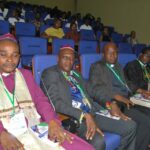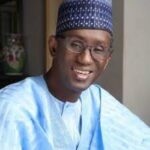*Says media didn’t do enough to point out security challenges INEC faced during poll
*Politicians pose biggest challenge to Nigeria’s electoral
Dr Chima Mathew Amadi, a public commentator and human rights activist has said that most of the post-election assessment of the elections has unfairly been narrowed down to the deployment of the Bimodal Verification and Accreditation System (BVAS) and the Instant Result Viewing portal, IReV.
Any credible assessment of elections in Nigeria has to appraise the entire process from start to finish, and not pick at parts of the process in isolation.
He said the media faced myriad of challenges in the performance of their roles in the 2023 general elections, noting that among these was the deployment of fake news which was done blatantly and effectively by major political players.
Amadi who is also a veteran in election observation stated this in his presentation titled: “post-2023 general elections: assessing the roles played by the media, INEC, security agencies and others” in Uyo at the ongoing All Nigerian Editors Conference.
He explained that the media did not always perform its role of leading the conversation on critical issues. In some instance, the media caught onto those issues late and in others, not at all. The end result was that the public often got its information and had its narrative shaped by opinions on social media by political players, most of whom had agendas.
In my assessment, the media did not do enough to point out the critical security challenges the electoral umpire faced before, during and after the elections.
He said, “For instance, over a 4-year period between 2019 and 2023 there were 50 attacks on INEC facilities in the country. A breakdown shows that in 2019, INEC recorded eight attacks; 22 in 2020, 12 in 2021, and eight in 2022. The incidents occurred in Osun, Ogun, Lagos, Ondo, Bayelsa, Anambra, Imo, Abia, Akwa-Ibom, Cross River, Enugu, Ebonyi, Kaduna, Borno, and Taraba states. One is of the opinion that not enough media spotlight was given to these attacks which were obviously done to weaken the capacity of the electoral umpire to conduct free and fair elections.”
He explained that some other challenges faced by INEC includes, most of which were not of its own making, included the cashless policy of the governemtn, internal sabotage of the electoral process by several Resident Election Commissioners (RECs) and ad-hoc staff.
He said, “one cannot complete an assessment of INEC’s role in the 2023 elections without commenting on the poor conduct of INEC permanent and ad-hoc staff in isolated incidents across the country. We had instances of senior officials going rogue like in Adamawa State, where the Resident Electoral Commissioner (REC), declared a candidate winner without due process of any sort of legal authority to do so.
We also had instances where ad-hoc staff, retained to ensure the smooth conduct of the elections, received monetary inducements to sabotage the same processes. We all know that many Nigerians see the elections as an opportunity to cash out and indeed create pockets of challenges in the process.
The occurrence of internal sabotage of the electoral process was to be expected. In the months before the 2023 elections, several Resident Election Commissioners (RECs) were appointed and sworn into office. These appointments were made in apparent violation of the provisions of the law and in spite of protestations by many stakeholders over their partisan pasts. These included at least a former governorship candidate of a political party; the younger sister of the South East National Vice President of a political party; a former civil servant dismissed from service in a state on account of corruption, and the manager of a hotel belonging to a politician who served as minister at the time of the appointment.
“A cursory study of the electoral trends will show that many illegal activities occurred and attempts at disrupting the system occurred in the states where these people were posted to serve.
“I do not believe there was sufficient public pressure to resist these appointments and attempts at sabotaging the electoral process from within. I also do not believe that enough was done to bring this issue to the limelight.
Amadi said despite all of this challenge, the 2023 election was the first election in the last 12 years that was not postponed.
Speaking on the role politicians played during the poll, he said political class remains the biggest challenge to the electoral system itself.
He said, “It is ironic that politicians pose the biggest threat to a democratic process. However, the winner takes all nature of our political system means that politicians have the most incentive to subvert the process. And over the years, they have demonstrated the willingness and desperation to subvert it.
“The ingenuity employed by politicians to seek out the loopholes in the legal and regulatory framework is enormous and their determination to find the gaps the process cannot be over emphasized.
“It is the politicians that have designed the system of vote buying to circumvent the innovation of card readers and BVAS. It is the politicians that offer monetary inducements to key stakeholders in the electoral process including security agents and staff of the electoral commission to subvert the process or to look the other way. It is the politicians who continuously stress test the electoral eco-system to find the ways to weaken the process and gain an undue advantage. It is the politicians who pay thugs to disrupt the casting of votes and collation of results, and in so doing endanger the lives and properties of Nigerians.
“It is now evident that the first step towards ensuring freer and more credible elections must resolve with designing systems that limit the influence politicians have over the electoral process. And this limitation must begin with reducing the influence politicians have over the appointment and employment of permanent and ad-hoc staff of the Commission.”



